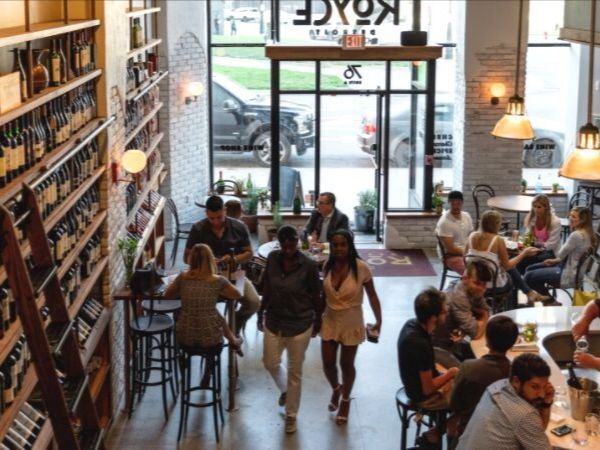Super Early Bird Deadline
October 31, 2025
Judging
Date
May 18, 2026
Winners
Announced
June 10, 2026

Wine shops are changing. Driven by a new generation of forward-thinking, open-minded drinkers, they’re not just places for picking up a bottle of what-you-know any more: they’re meeting places, bars, educational spaces and more. One of the best is The Royce, a shop and wine in Detroit. We spoke to owner Ping Ho, who also owns The Marrow, a new restaurant in the city, about how winemakers can get their products into her shop.
 “It definitely does. The wine business is special for many reasons in terms of communicating praise, communicating farming practices, history, culture. Buyers, sellers can actually interact with the winemakers. I've definitely had some... I endeavor to meet winemakers, either by visiting vineyards or, oftentimes they do travel to places like Detroit and stop by to visit the markets and taste with potential or existing buyers.
“It definitely does. The wine business is special for many reasons in terms of communicating praise, communicating farming practices, history, culture. Buyers, sellers can actually interact with the winemakers. I've definitely had some... I endeavor to meet winemakers, either by visiting vineyards or, oftentimes they do travel to places like Detroit and stop by to visit the markets and taste with potential or existing buyers.
“There's nothing like sharing firsthand about how a wine is made and the techniques and learning about the history of the wine-making family. Basically, it couldn't be more important.”
“I'm open to it. Usually it's through a distributor. They would contact me and say, "Hey, there's a winemaker in town. Would you like to meet him or her?" Or, I've also planned trips. For example, last year I went to Burgundy and basically was set up with a number of different meetings with the winemakers and so it goes both ways. It's either outreach or them saying they're in the market and would love to meet and taste.”
“Not really. I haven't experienced that personally. Obviously, I think the types of wines that I appreciate and I focus on buying are small production, family-run wineries. Sustainability is a focus. All that. I'm always open when winemakers want to promote, sell their wines, have me taste them. Because I respect the craft, right? I respect how much effort goes into making wine.”
“It really depends on the types of wine that... I carry over 500, 600 wines at my wine bar and shop and then I have a restaurant and a couple more projects, so I'm always looking for variety. I'm not tied to one, I don't limit the number of wines I could carry from one particular winery but it's really decided on not just availability, but what sells and what categories I need to fill at any given time. And price points as well!”
“How it's made. How it's farmed. The viticulture aspect of the wine. I focus on a lot of sustainably-made wine, from organic, biodynamic. Natural is a very large definition these days. Somewhat controversial, too. Low-intervention wine making is something that I believe in. I appreciate knowing how the winemaker makes the wine. I like hearing things, you know, it's a third generation, fourth generation wine making family - but a team who purchase the grapes but make these cool wines out of a warehouse in California, that's also a cool story, right?”

“It's pretty important, but at the end of the day, if it's like an ugly label but the wine's good, I think the quality of the wine takes precedent. Yeah, the labels that look unique, interesting, and there's thought gone into designing them, that always helps to sell. I think more so the consumer likes funky, cool labels increasingly. Especially the younger generation of winemakers, there's a lot of quirky, cute labeling that happens. I would say it’s fairly important, particularly, it helps to sell. It's a selling point, right?”
“All the time. Especially with the large import companies; oftentimes I'll see something on Instagram and it's like, "Oh that seems really cool." And I reach out to my distributor who has that portfolio and they're like, "Oh, sorry. Not in the market. If you want to carry it you have to commit to a pallet." I'm like, "Okay, I can't do that." So it's an issue. It's an issue for smaller, secondary markets in particular. I'm constantly trying to change that, but it's challenging.”
Enter your Wines now and get in front of top Sommeliers, Wine Directors, and On-Premise Wine Buyers of USA.
